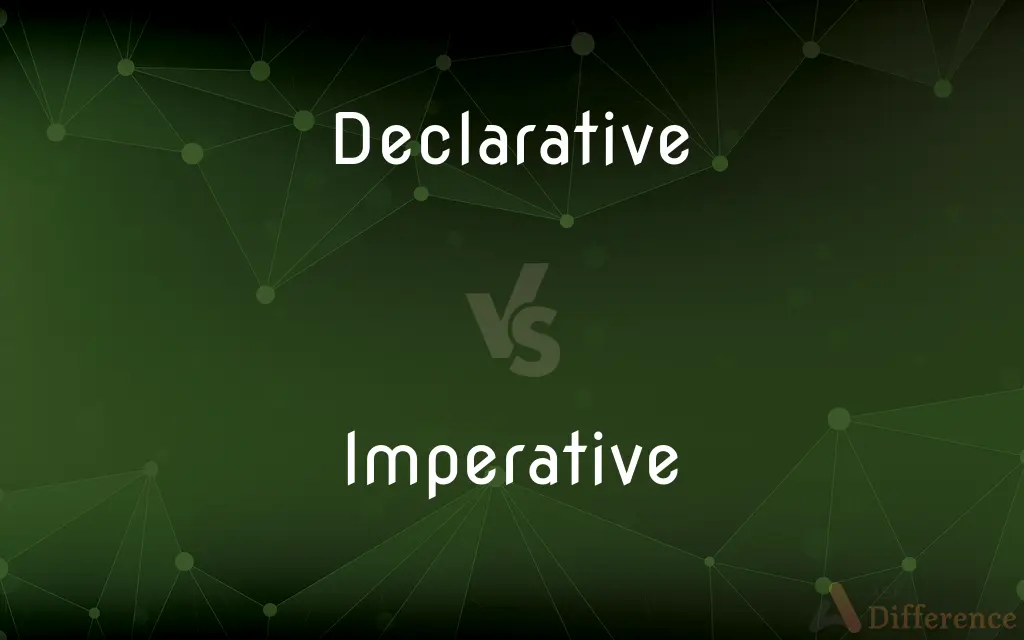Declarative vs. Imperative — What's the Difference?
By Tayyaba Rehman — Updated on October 30, 2023
Declarative sentences state facts or opinions, while imperative sentences give commands, requests, or instructions.

Difference Between Declarative and Imperative
Table of Contents
ADVERTISEMENT
Key Differences
Declarative sentences are primarily used to convey information, express opinions, or declare certain truths. They simply state what is, was, or will be, and they typically end with a period. On the other hand, Imperative sentences are primarily used to give instructions, make requests, or issue commands, making them action-oriented in nature. They often end with either a period or an exclamation mark.
The nature of Declarative language is to be informative and direct, ensuring that the recipient gains a clear understanding of the information being presented. Imperative language, in contrast, seeks to prompt action or a response from the listener or reader, making it inherently more dynamic.
Declarative sentences usually have a subject, but it's often implicit in Imperative sentences. For instance, in the command "Close the door," the subject (you) is understood but not explicitly stated. This contrasts with Declarative statements like "The door is closed," where the subject is clear.
Declarative statements play a critical role in narrative, explanatory, and informational texts where the main aim is to present facts or a sequence of events. Imperative statements are more commonly found in instructional texts, recipes, or when someone is giving direct advice or orders.
The distinction between Declarative and Imperative can be seen in how they engage with the audience. While Declarative sentences aim to inform or explain, Imperative sentences engage directly, often asking the audience to perform a specific task or consider a directive.
ADVERTISEMENT
Comparison Chart
Primary Purpose
To state facts or opinions.
To give commands or instructions.
End Punctuation
Typically ends with a period.
Can end with a period or exclamation mark.
Presence of Subject
Usually has an explicit subject.
Often has an implicit subject (e.g., "you").
Usage Context
Narrative or informational texts.
Instructional texts or directives.
Engagement with Audience
Aims to inform or explain.
Directly prompts action or response.
Compare with Definitions
Declarative
Asserting a fact or belief confidently.
Declarative sentences provide clear information.
Imperative
Requiring attention or action.
The urgent situation was imperative.
Declarative
Specifying the grammatical mood that indicates a fact.
She writes daily is a declarative sentence.
Imperative
Being authoritative or dictatorial.
He spoke in an imperative tone.
Declarative
Relating to declaration or formal announcement.
The declarative intent of the document was clear.
Imperative
Expressing a command or plea.
Close the door!
Declarative
Describing a straightforward manner of expression.
His declarative style left no room for doubt.
Imperative
Crucial or of utmost importance.
It's imperative to follow the guidelines.
Declarative
Making a statement or expressing an opinion.
The sky is blue.
Imperative
Necessary or urgent
"It is imperative that we continue to move with speed to make housing more affordable" (Timothy Geithner).
Declarative
Serving to declare or state.
Imperative
Expressing a command or plea; peremptory
Requests that grew more and more imperative.
Declarative
Of, relating to, or being an element or construction used to make a statement
A declarative sentence.
Imperative
(Grammar) Of, relating to, or constituting the mood that expresses a command or request.
Declarative
A sentence or expression that makes a statement.
Imperative
A rule, principle, or need that requires or compels certain action
"the internal tension in [military] doctrine, between the desire to prescribe a common way of fighting and the imperative of adjusting particular military actions to circumstances" (Eliot A. Cohen).
Declarative
Serving to declare; having the quality of a declaration.
Imperative
A command; an order.
Declarative
Expressing truth.
Imperative
The imperative mood.
Declarative
(programming) That declares a construct.
Imperative
A verb form of the imperative mood.
Declarative
(programming) A way of programming that is most akin to just stating what is wanted, rather than having to describe how to do it. w:Declarative programming
Imperative
Essential; crucial; extremely important.
That you come here right now is imperative.
Declarative
Synonym of declaration(declarative statement)
Imperative
(grammar) Of, or relating to the imperative mood.
Declarative
Making declaration, proclamation, or publication; explanatory; assertive; declaratory.
The "vox populi," so declarative on the same side.
Imperative
(computing theory) Having semantics that incorporates mutable variables.
Declarative
A mood (grammatically unmarked) that represents the act or state as an objective fact
Imperative
Expressing a command; authoritatively or absolutely directive.
Imperative orders
Declarative
Relating to the use of or having the nature of an interrogation
Imperative
The grammatical mood expressing an order (see jussive). In English, the imperative form of a verb is the same as that of the bare infinitive.
The verbs in sentences like "Do it!" and "Say what you like!" are in the imperative.
Declarative
Relating to the mood of verbs that is used simple declarative statements;
Indicative mood
Imperative
A verb in imperative mood.
Imperative
(countable) An essential action, a must: something which is imperative.
Visiting Berlin is an imperative.
Imperative
Expressive of command; containing positive command; authoritatively or absolutely directive; commanding; authoritative; as, imperative orders.
The suit of kings are imperative.
Imperative
Not to be avoided or evaded; obligatory; binding; compulsory; as, an imperative duty or order.
Imperative
Expressive of commund, entreaty, advice, or exhortation; as, the imperative mood.
Imperative
The imperative mood; also, a verb in the imperative mood.
Imperative
A mood that expresses an intention to influence the listener's behavior
Imperative
Some duty that is essential and urgent
Imperative
Requiring attention or action;
As nuclear weapons proliferate, preventing war becomes imperative
Requests that grew more and more imperative
Imperative
Relating to verbs in the imperative mood
Imperative
Relating to verbs that give commands.
Listen! is in the imperative mood.
Common Curiosities
Do declarative sentences always state facts?
No, they can also state opinions, such as "Chocolate is the best dessert."
Can imperative sentences be polite?
Yes, imperative sentences can be phrased politely, such as "Please pass the salt."
Can you recognize imperative sentences by punctuation?
Not always. While they can end with exclamation marks, they often end with periods.
Are all sentences either declarative or imperative?
No, sentences can also be interrogative (asking questions) or exclamatory (expressing strong emotion).
Are declarative statements subjective?
They can be. While many state facts, they can also express opinions.
What's the main difference in intent between declarative and imperative?
Declarative aims to inform, while imperative aims to prompt action.
Is there a specific tone associated with declarative sentences?
They're typically neutral, but tone can vary based on context.
Are imperative sentences always short?
No, but they're often concise to make commands clear.
Why are imperative sentences often used in instructions?
Because they give direct commands or requests, making steps clear.
Can a declarative sentence be a question?
No, questions are typically interrogative. Declarative sentences make statements.
How are imperative sentences in advertising effective?
They prompt action, e.g., "Buy now!" or "Call today!"
Is the imperative mood only about giving orders?
No, it can also express requests, advice, or suggestions.
Can an imperative sentence be passive?
It's less common, but yes. E.g., "Be informed by the manager."
Can a declarative statement be an opinion?
Yes, e.g., "Ice cream tastes better than cake."
Can declarative and imperative sentences be combined?
Yes, in longer texts or dialogue, both can be present.
Share Your Discovery

Previous Comparison
Annoyed vs. Anger
Next Comparison
Untradeable vs. UntradableAuthor Spotlight
Written by
Tayyaba RehmanTayyaba Rehman is a distinguished writer, currently serving as a primary contributor to askdifference.com. As a researcher in semantics and etymology, Tayyaba's passion for the complexity of languages and their distinctions has found a perfect home on the platform. Tayyaba delves into the intricacies of language, distinguishing between commonly confused words and phrases, thereby providing clarity for readers worldwide.















































